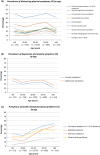Age, time living with diagnosed HIV infection, and self-rated health
- PMID: 27385511
- PMCID: PMC5245118
- DOI: 10.1111/hiv.12398
Age, time living with diagnosed HIV infection, and self-rated health
Abstract
Objectives: An increasing proportion of people living with HIV are older adults, who may require specialized care. Adverse physical and psychological effects of HIV infection may be greatest among older people or those who have lived longer with HIV.
Methods: The ASTRA study is a cross-sectional questionnaire study of 3258 HIV-diagnosed adults (2248 men who have sex with men, 373 heterosexual men and 637 women) recruited from UK clinics in 2011-2012. Associations of age group with physical symptom distress (significant distress for at least one of 26 symptoms), depression and anxiety symptoms (scores ≥ 10 on PHQ-9 and GAD-7, respectively), and health-related functional problems (problems on at least one of three domains of the Euroqol 5D-3L)) were assessed, adjusting for time with diagnosed HIV infection, gender/sexual orientation and ethnicity.
Results: The age distribution of participants was: < 30 years, 5%; 30-39 years, 23%; 40-49 years, 43%; 50-59 years, 22%; and ≥ 60 years, 7%. Overall prevalences were: physical symptom distress, 56%; depression symptoms, 27%; anxiety symptoms, 22%; functional problems, 38%. No trend was found in the prevalence of physical symptom distress with age [adjusted odds ratio (OR) for trend across age groups, 0.96; 95% confidence interval (CI) 0.89, 1.04; P = 0.36]. The prevalence of depression and anxiety symptoms decreased with age [adjusted OR 0.86 (95% CI 0.79, 0.94; P = 0.001) and adjusted OR 0.85 (95% CI 0.77, 0.94; P = 0.001), respectively], while that of functional problems increased (adjusted OR 1.28; 95% CI 1.17, 1.39; P < 0.001). In contrast, a longer time with diagnosed HIV infection was strongly and independently associated with a higher prevalence of symptom distress, depression symptoms, anxiety symptoms, and functional problems (P < 0.001 for trends, adjusted analysis).
Conclusions: Among people living with HIV, although health-related functional problems were more common with older age, physical symptom distress was not, and mental health was more favourable. These results suggest that a longer time with diagnosed HIV infection, rather than age, is the dominating factor contributing to psychological morbidity and lower quality of life.
Keywords: HIV; ageing; anxiety; depression; symptoms; wellbeing.
© 2016 The Authors. HIV Medicine published by John Wiley & Sons Ltd on behalf of British HIV Association.
Figures

References
-
- May M, Gompels M, Sabin C. Life expectancy of HIV‐1‐positive individuals approaches normal conditional on response to antiretroviral therapy: UK collaborative HIV cohort study. J Int AIDS Soc 2012; 15(Suppl 4): 18078.
-
- Public Health England . HIV in the United Kingdom: 2014 report. Public Health England, UK, 2014.
-
- UNAIDS . AIDS by the numbers. UNAIDS Corporate Publications, http://www.unaids.org/en/resources/documents/2015/AIDS_by_the_numbers_2015, 2013.
-
- Chambers LA, Wilson MG, Rueda S, Gogolishvili D, Qiyun Shii M, Rourke SB for the Positive Aging Review Team. Evidence informing the intersection of HIV, aging and health: a scoping review. AIDS Behav 2014; 18: 661–675. - PubMed
-
- O'Keefe KJ, Scheer S, Chen MJ, Hughes AJ, Pipkin S. People fifty years or older now account for the majority of AIDS cases in San Francisco, California, 2010. AIDS Care 2013; 25: 1145–1148. - PubMed
Publication types
MeSH terms
Grants and funding
LinkOut - more resources
Full Text Sources
Other Literature Sources
Medical

